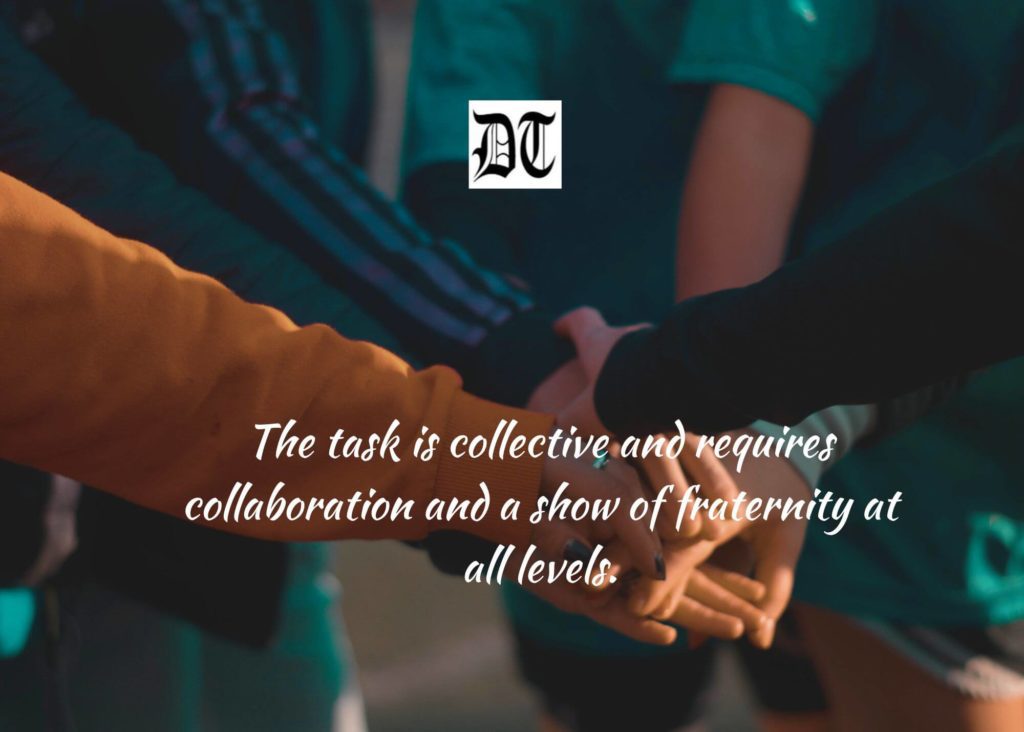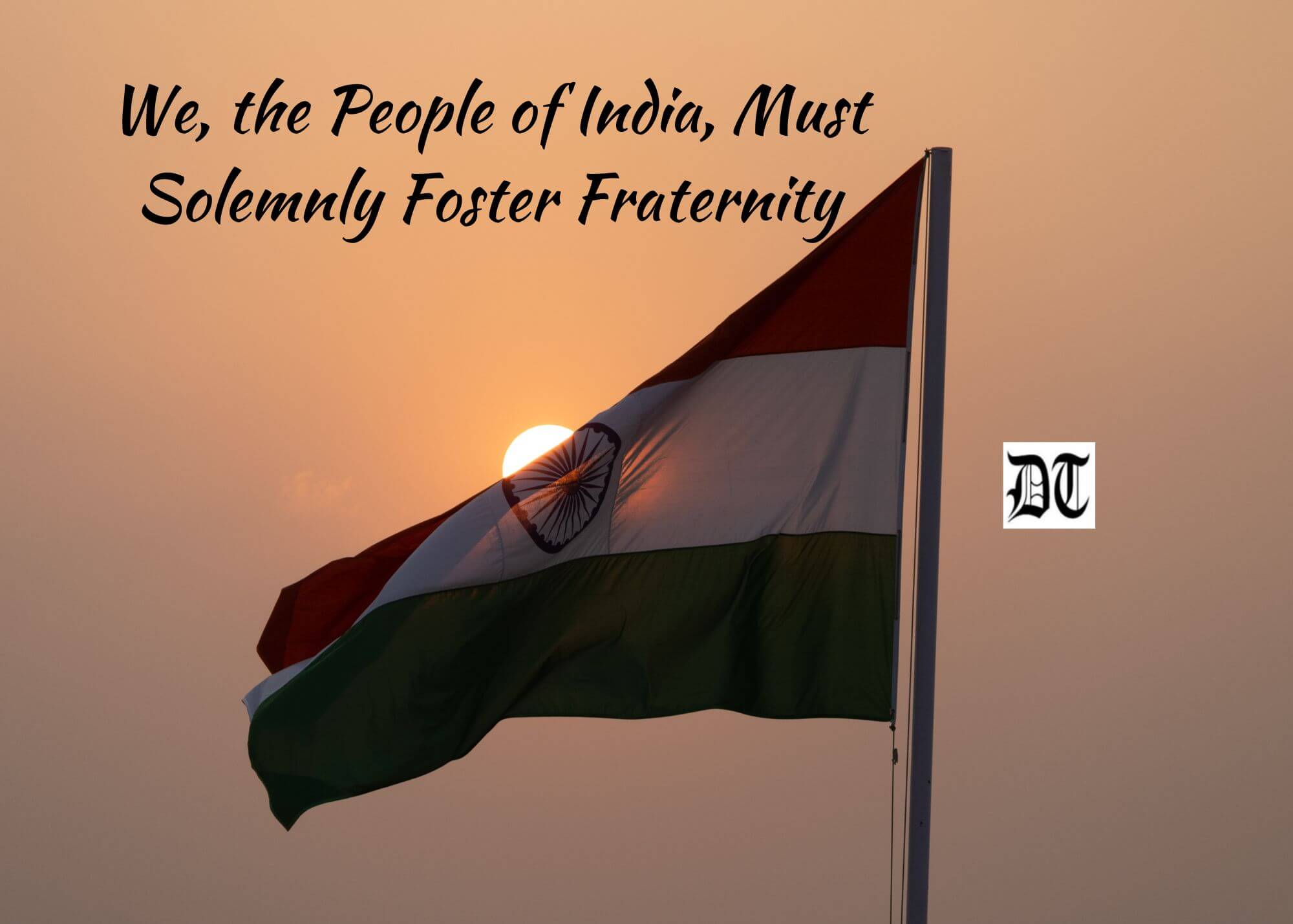Reading Time: 4 minutes
To overcome the thorns in the path of fostering fraternity – we, the people of India – must take some solemn pledges together, opines Ram Krishna. A Special Feature, exclusively for Different Truths on the eve of Independence Day.
On August 15, 1947, India not only broke herself free from colonial political control but set out on a long march to fulfil the promises of the freedom struggle, meet the people’s hopes, and accomplish the task of nation-building. And the first task was to preserve, consolidate, and strengthen India’s solidarity and unity.
Indian unity, it was realised, was not to be taken for granted. It had to be strengthened by recognising and accepting India’s immense regional, linguistic, ethnic, and religious diversity. Indianness was further fostered by acknowledging and accommodating the fellow citizens’ multiple identities. The task of promoting fraternity was thus indeed daunting, yet, the key to India’s peace, progress and prosperity.
Rich Legacy of Freedom Struggle
The legacy of the freedom struggle was rich. The broad social consensus on the values of nationalism, secularism and democracy was an endowment the free country received, on which the path of nation-building was to be charted. The national movement had gifted us the political tradition of compromise, accommodation and reconciliation of different opinions and interests.
The broad consensus on the practice of non-violence … contributed to creating a temper of democracy in the country.
The broad consensus on the practice of non-violence during the national movement also contributed to creating a temper of democracy in the country. Backed by public opinion, discussion, debate, and persuasion were stressed for advancing social and political change instead of glorifying mistrust, animosity and violence. The major political parties did not insist on uniformity of views within their ranks. They tolerated and encouraged different and minority voices.
Fraternity & Social Democracy
It is on the pillar of fraternal relations that a well-functioning and healthy democracy rests. Dr B.R. Ambedkar, the architect of our Constitution, held that political democracy could not last unless there lies at its base social democracy. By social democracy, he meant a way of life that recognises liberty, equality, and fraternity as life principles. They form a union of trinity in that divorcing one from the other defeats the very purpose of democracy.
Ambedkar said, “Fraternity means a sense of common brotherhood of all Indians – of Indians being one people….”
Elaborating on the uniqueness and importance of fraternity, Ambedkar said, “Fraternity means a sense of common brotherhood of all Indians – of Indians being one people. It is the principle which gives unity and solidarity to social life”. He reminded, “without fraternity, equality and liberty will be no deeper than coats of paint.”
Signs of Fragility in Fraternity
However, the tradition of consensus and reconciliation expected to guide and steer solidarity and fraternity was eroded during the early part of the post-independence era. The riots in the name of the language, caste and communal issues generated a lot of negative energy and, in the process, depleted much of our social capital. Yet, all this political and social churning was not a shocker.
Mahatma Gandhi had predicted on the eve of independence that ‘with the end of slavery and the dawn of freedom, all the weakness of society are bound to come to the surface.’ Thus, the initial optimism for unity and a sense of nationhood, born out of the glorious legacy of the freedom movement, mature political leadership, and constitutional ethos, started to wane.

Debasement of Politics
In this general degeneration of mutual trust and social cohesion, one sad part was the erosion of credibility of the political parties. This had adverse multiplier effects which pervaded our social and economic life. Mudslinging, infighting and factionalism within parties and the absence of long-term political programmes have been grave maladies. Indulging in unabashed populism, the political outfits started diverting political debate from programmes and policies to peripheral issues. Many also started stoking ill-will and animosity, relying on sensitive and divisive issues of religion, caste and regional chauvinism as part of their vote-bank politics.
The debasement of Indian polity has now led to many other disturbing trends.
The debasement of Indian polity has now led to many other disturbing trends. All-important national issues and programs are seen from the lens of partisan politics. As the old consensus framework through debate and discussion remained largely unutilised or bypassed, all kinds of street protests are the order of the day. Dharnas, bandhs, blockage of roads, rioting, mob lynching, wanton violence, attack on private and public property, with overt or covert political support. The situation has come to such a sorry pass that not only educational and military institutions but even constitutional bodies are also witnessing the encroachment of politics. All these developments have grossly vitiated our country’s social fabric and public life.
Toxicity in the Air & the Role of Social Media
The amplifying power of social media, coupled with the absence of its accountability, has made matters worse by providing a fertile ground to create divisions and fissures in society. Misinformation, disinformation, outrage, hate speech- all are in full play through the medium. In this mega drama, all actors from all walks of life, particularly political affiliations and associations, enact their roles actively, often with vicarious pleasure. In a country where a sense of entitlements and rights overwhelm an understanding of responsibilities and duties, where people are still unaware or unmindful that freedom of expression has certain well-meaning caveats, the noise and outbursts on social media are quickly drowning signal and sanity. All this is pervading toxicity in social relations and distrust between communities.
Way Forward
Any vibrant democracy is an alchemic mix of diversity and plurality, driven by a sense of shared destiny that allows for the differences to get subsumed within the more extensive pursuit of nation-building. As we enter “AmritKaal”, the next quarter of the century leading to a hundred years of our independence will be critical. The strides we have so painstakingly made over decades on space, infrastructure, entrepreneurship, economy, and governance would have to leapfrog, in terms of scale and momentum, during the period to meet the aspirations of our billion-plus people. The task is collective and requires collaboration and a show of fraternity at all levels.
The success of our fraternity project would essentially require that we -each one of us- focus more on building bridges and commonality rather than stoking differences and discord, being mindful of our duties rather than remaining obsessed with only entitlements, generating public empathy rather than appropriating negativity and cynicism for perverse reasons. These are some of the pledges we-the people of India – have to take together solemnly.
Picture design by Anumita Roy, Different Truths

















Words of wisdom!